Houston Rockets
Houston Rockets Salary Cap Update: 2019 Offseason Pre-Draft Edition
Having come up just short to the Warriors again, Daryl Morey must find creative ways to improve the Rockets this offseason
Published
5 years agoon
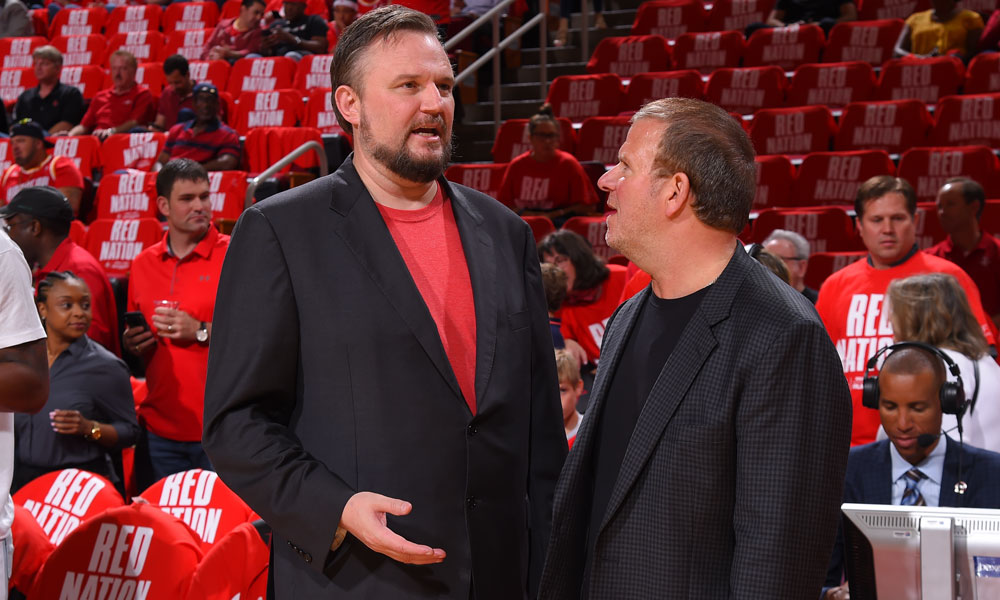
Another season of title contention. Another playoff series loss to the Golden State Warriors, one of the greatest basketball teams of all time.
After an incredibly rocky start (11-14 record), the Houston Rockets played at a top-notch level for most of the 2018-19 season. Unfortunately, the hole they dug for themselves was a tad too steep to get a top-2 playoff seeding, leading to a second round matchup against the Warriors rather than the return trip to the Western Conference Finals that the Rockets – and most of their fans – had been expecting. With their season now over, GM Daryl Morey and the Rockets must look to the offseason for ways to improve their roster and keep their title contention window open.
Player Salary, Exceptions and Available Cap Room
The Houston Rockets currently have the following player salary commitments, cap holds and salary cap exceptions available for the 2019-20 season (assuming that the league’s current projection of a $109 million salary cap is accurate):
Player salary commitments: Chris Paul ($38.5 million), James Harden ($38.15 million*), Clint Capela ($14.9 million), Eric Gordon ($14.1 million), PJ Tucker ($8.35 million), Nene Hilario ($3.83 million – player option), Isaiah Hartenstein ($1.42 million, 50% guaranteed until July 15), Gary Clark ($1.42 million, partial guarantee unclear), Chris Chiozza ($1.42 million, non-guaranteed), Michael Frazier ($1.42 million, non-guaranteed), and a dead cap hit for Troy Williams ($122,741 – get used to this one being on the books). (*Harden’s starting salary under his new Designated Veteran Player Extension [DVPE] will be 35% of the actual 2019-20 salary cap figure.)
Cap holds: Iman Shumpert ($16.52 million – Rockets hold full Bird rights), Danuel House (restricted free agent; $1.88 million [assuming a qualifying offer is made] – Rockets have a right of first refusal but only hold Non-Bird rights), Gerald Green ($1.62 million – Rockets hold Early Bird rights), Austin Rivers ($1.62 million – Rockets have only Non-Bird rights), Kenneth Faried ($1.62 million – Rockets have only Non-Bird rights), Vincent Edwards (potential restricted free agent; about $1.47 million – coming off a two-way contract), and Trevon Duval (about $1.47 million – coming off a two-way contract).
Other Salary Cap Exceptions: If Houston operates over the salary cap this summer (extremely likely), the Rockets will have access to the Mid-Level Exception (MLE), either the Non-Taxpayer variety ($9.25 million, the use of which would impose a hard cap at the “apron” level – currently projected at about $138.5 million) or the Taxpayer variety ($5.71 million). Although it would also impose a hard cap at the apron level, Houston could possibly use the Bi-Annual Exception ($3.62 million), since they did not use it last summer. In the unlikely event that the Rockets use cap room this summer, they could instead have the Room Exception of $4.76 million at their disposal. Assuming they operate over the salary cap, the Rockets will have a staggering nine traded player exceptions (TPEs) left over from earlier trades, although none of them is very large (their largest TPE is $3.62 million).
Given their salary commitments, the Rockets are pretty much hopelessly over the cap and will likely be paying the luxury tax for the 2019-20 season.
Preliminary Internal Decisions
Ahead of the NBA Draft and the subsequent free agent season, Morey and his staff will need to address some internal matters.
Despite his disappointing playoff performance, Houston will probably still extend a qualifying offer to House in order to make him a restricted free agent and to give the Rockets the ability to match (some) offers from other teams. More on that below.
The Rockets can make Edwards – coming off a two-way contract – a restricted free agent by extending him another two-way contract for next year (with $50,000 guaranteed) as a qualifying offer.
It is unclear whether Houston can do the same with Duval. A two-way player must be on a team’s NBA roster for at least 15 days in order for the team to be able to extend the player a qualifying offer (and make him a restricted free agent). Odds are, Duval will be an unrestricted free agent this summer.
An Extension for Gordon?
In a recent interview, Rockets owner Tilman Fertitta mentioned that he would like to try to extend Gordon’s contract this summer. Gordon (set to be an unrestricted free agent in 2020) was arguably the Rockets’ second best player during the playoffs, so it is clear why the Rockets would want to keep him in the fold beyond next season.
The highest starting salary Houston could offer Gordon in an extension is about $16.9 million, with a four-year extension topping out at around $76.6 million in total salary. Gordon turns 31 next season, so there is a chance he would agree to an extension if it added enough years of guaranteed salary.
If a proposed extension was in connection with an extend-and-trade scenario, however, the Rockets would be limited to offering him a starting salary of less than $14.8 million, making such a scenario less likely. Gordon is probably one of the Rockets’ most attractive trade assets right now, so it remains to be seen whether the team looks to move its talented third guard for help at another position.
Quiet Draft Night Expected
The Rockets will enter the 2019 NBA Draft without any picks, having traded away their first rounder (26th overall) to dump Brandon Knight‘s contract and having long ago dealt their second rounder (55th overall) in the totally-worth-it move to acquire Pablo Prigioni in 2015. Unlike in prior years, Houston will not have much cash available to buy draft picks, having already spent all but about $565,000 on other trades this past season.
While a trade for a draft pick is still possible, the most likely scenario has the Rockets sitting out the draft, instead looking to sign at least one of the top undrafted players, as they did with Clark last year.
If Houston somehow pulls off a big draft night trade in which more salary is acquired than is sent out, it would not likely cause them to pay any luxury tax. That would only happen if the trade involves a substantial trade bonus. Of course, a trade could be agreed to in principle, with the actual consummation of that trade not going through until following the July Moratorium.
Internal Free Agent Decisions
Houston will have some decisions to make with their own free agents heading into July, including how to prioritize which free agents to bring back.
Austin Rivers: Rivers did a good job as the Rockets’ fourth guard this season, providing some high-energy on-ball defense and some timely (albeit inconsistent) scoring off the bench. While Rivers agreed to a prorated vet minimum contract with Houston after being bought out of a large contract, he is unlikely to accept another minimum salary for next season. With only Non-Bird rights, the Rockets may need to use most or all of the Taxpayer MLE to bring him back … assuming even that is enough. The maximum salary Houston could pay Rivers next season using Non-Bird rights will be about $2.6 million. Could a two-year, $5.34 million Non-Bird deal (with a player option for Year 2) be enough to entice him to stay? Probably not.
Danuel House Jr.: House’s free agency will be one of the more interesting situations in the league to monitor. After refusing a three-year vet minimum deal from the Rockets (followed by a leverage-motivated stay in the G-League), House hopes that the flashes he showed as a key contributor for Houston during the middle part of the season will translate into a more lucrative contract this summer. Many teams may be scared off a little if House is made a restricted free agent, especially if the Rockets do not spend their MLE at the outset of free agency. However, since the Rockets only have Non-Bird rights to House, the Taxpayer MLE will likely be the most Houston could pay him, so an offer sheet in excess of that amount would be pretty much impossible to match. The maximum salary Houston could pay House next season using Non-Bird rights will be just over $2 million, with a total contract value maxing out at four years, $8.65 million. That’s better than a three-year vet minimum deal. House’s value could fluctuate wildly, as teams are in desperate need of wings with size and shooting ability. All it takes is one team to price House out of the Rockets’ range, restricted status be damned.
Kenneth Faried: After an initial burst onto the scene with the Rockets, Faried’s production tapered off, and he eventually found himself outside the playoff rotation. A capable pick-and-roll finisher and a very good rebounder, Faried never seemed to master the Rockets’ defensive schemes. Never known as a top-notch defender, Faried became virtually unplayable against the Warriors. Still, he is a capable regular season player who could fill a role in Houston next season. The most Houston could pay Faried next season using Non-Bird rights will be about $2.8 million. While Faried may look for a bigger payday elsewhere, a return to Houston on a vet minimum deal (or via Non-Bird rights) could be a possibility.
Iman Shumpert: Shumpert (to whom the Rockets have full Bird rights) could be back next season as a defensive wing off the bench without Houston having to tap into its MLE, or he could serve a different function entirely. With the trade to acquire Shumpert last February, the Rockets gave up the last significant piece of non-core salary filler (Knight) to use in trades for next season and beyond, leading many to wonder how Houston could add to its core of Harden, Paul, Capela, Gordon and Tucker going forward. Coming off a contract that paid him over $11 million last season, Shumpert could potentially serve as that missing salary filler in a major trade. He could be signed-and-traded – along with other assets – to a team that is well enough below the luxury tax threshold in exchange for a high-salaried player. While sign-and-trade deals are extremely rare under the new CBA, this remains another avenue (however unlikely) for the Rockets to upgrade their roster.
Gerald Green: Until his disappointing playoff performance, Green’s free agency was gearing up to be one of the more underrated storylines for Houston this summer. With his Early Bird rights now in tow, the Rockets were in position to potentially give Green a significant raise after he took what was probably a below-market deal to return to Houston last season for the vet minimum. However, at this point, given the Rockets’ apparent focus on adding more defense to their bench, it is unlikely that Green (who turns 34 next season) will get an offer from Houston in excess of another minimum salary contract … if he gets an offer at all. A hometown cult hero, Green has been extremely popular with Rockets fans, but it may be time to move on.
Vincent Edwards: After investing $1.5 million to purchase the draft pick used to select Edwards (billed as a jack-of-all-trades combo forward), the Rockets are probably a little disappointed in Edwards’s uninspiring performance in the G-League this past season. He was not awful, but he was not particularly good either. Still, the Rockets could possibly reward Edwards for his willingness to sign a two-way contract last season rather than taking the required tender of a non-guaranteed NBA contract. Also, as a second round pick, Edwards would count a little less for luxury tax purposes on an NBA minimum contract than a similarly situated undrafted player (such as Clark) will. Will that sliver of luxury tax savings – along with his potential as another bench forward – be enough for Edwards to find a place on the Rockets’ 15-man roster? A lot will depend on other, more important roster moves.
Trevon Duval: As noted above, Duval will probably be an unrestricted free agent this summer. It is unlikely that Duval will return on an NBA contract with any meaningful guaranteed salary. He remains a possibility to return on a two-way contract, although it seems more likely that the Rockets will explore other options for that two-way roster spot.
Sergio Llull: No Salary Cap Update by this author would be complete without another check-in on Llull’s situation. While not technically a free agent, Houston still holds his exclusive NBA rights. Rated in a recent poll of NBA general managers as the best (non-prospect) player in the world not playing in the NBA, Llull continues to be an intriguing option in the Rockets’ long-term roster building plans. Morey continues to visit Llull to gauge his interest in (eventually) coming over to the NBA. But given the dearth of meaningful salary cap exceptions, and with a strong guard rotation currently in place, it is unlikely that Llull plays for the Houston Rockets in 2019-20. It is possible that Houston could use its MLE on Llull in the event that Gordon is traded, but Rockets fans should not be holding their breath on that scenario playing out. Llull’s draft rights still have trade value, so there’s a chance he could be moved this summer. If not, 2020 may be the year we finally see Llull in a Rockets (or other NBA team) jersey.
The Jimmy Butler Gambit
Houston tried hard early in the season to trade for Jimmy Butler before resigning themselves to their fallback option of avoiding the luxury tax. Now, with Butler nearing (potential) free agency, the Rockets could be poised to make another run at him.
While it would be extremely difficult (if not impossible) to sign Butler outright as a free agent, the Rockets could potentially trade for him if he picks up the $19.8 million player option on his contract for 2019-20, on the condition that Philadelphia 76ers trade him to the team of his choice.
Butler would likely be leaving a considerable sum of money on the table by opting in, as his max starting salary as a free agent would be around $32.7 million. He would need some assurances from whichever team trades for him that he would be adequately compensated in 2020. Houston (allegedly) has a proven track record of doing just that with Paul.
Would a package of Gordon, Nene (assuming he picks up his own player option) and a first round pick be enough to convince the 76ers to move Butler? Facing a potential financial crunch, Philly would welcome a strong shooting guard like Gordon on a value contract. It remains to be seen, however, just how highly the 76ers value Butler as part of their future.
Fortunately, the Rockets won’t have to wait long for the Butler scenario to play out. Butler must exercise his player option by June 29, making a trade likely shortly (if not immediately) thereafter.
Outside Free Agents
Due to team salary constraints and the likely need to maximize overall flexibility, the only salary cap exception of any significance available to the Rockets this summer will probably be the Taxpayer MLE.
With an estimated maximum starting salary of $5.71 million and topping out at three years, just under $18 million, the Taxpayer MLE may not be able to compete with other offers the second-, third- or even fourth-tier free agents may get, especially since several teams expect to have significant cap room this summer. However, there may be some veterans willing to take less in order to contend for a title. Also, playing under coach Mike D’Antoni has been known to buoy a player’s stock, which could be useful heading into 2020 free agency, when most of the league will have oodles of money to spend.
Other “MLE-caliber” free agents seeking a meaningful rotation role on a title contender might be willing to sign in Houston for the vet minimum, just as Luc Mbah a Moute, James Ennis and Carmelo Anthony were drawn to the Rockets in recent years.
I will leave it to others (or at least won’t cover it here) as to which particular free agents the Rockets will pursue this summer.
The Taxman Cometh (for real this time)
Amazingly, Morey and the Rockets were able to duck the luxury tax this past season. And while it cost them some future assets, that tax avoidance strategy did not likely impact Houston, basketball-wise, this season. Meanwhile, now the earliest the Rockets would have to pay the dreaded “repeater tax” – something that Fertitta has openly said he wants to avoid – is the 2022-23 season, after Paul’s massive contract has expired.
If Houston only brings back its core guys and fills out the roster with vet minimum signings, the Rockets’ team salary should exceed the luxury tax threshold. Harden’s DVPE alone will materially increase team salary. Throw in a couple of trades that add salary (including the possible use of their TPEs) along with a Taxpayer MLE signing and re-signing Shumpert to even a modest new deal, and the tax bill will increase substantially.
But after avoiding the tax this past season, expect Fertitta to cut his first luxury tax check after next season.
Conclusion
After once again falling short of beating the Warriors and achieving their championship goal, the Houston Rockets must go back to the drawing board and try to find ways to further improve their roster. That improvement could come via trade, free agency, internal improvement or all of the above. The Rockets will explore all avenues to improve and to make another title run next season.
Luxury tax be damned. Probably.
You may like
Houston Rockets
Houston Rockets Draft Decisions: Who Will Be the #3 Pick?
Published
4 months agoon
June 24, 2024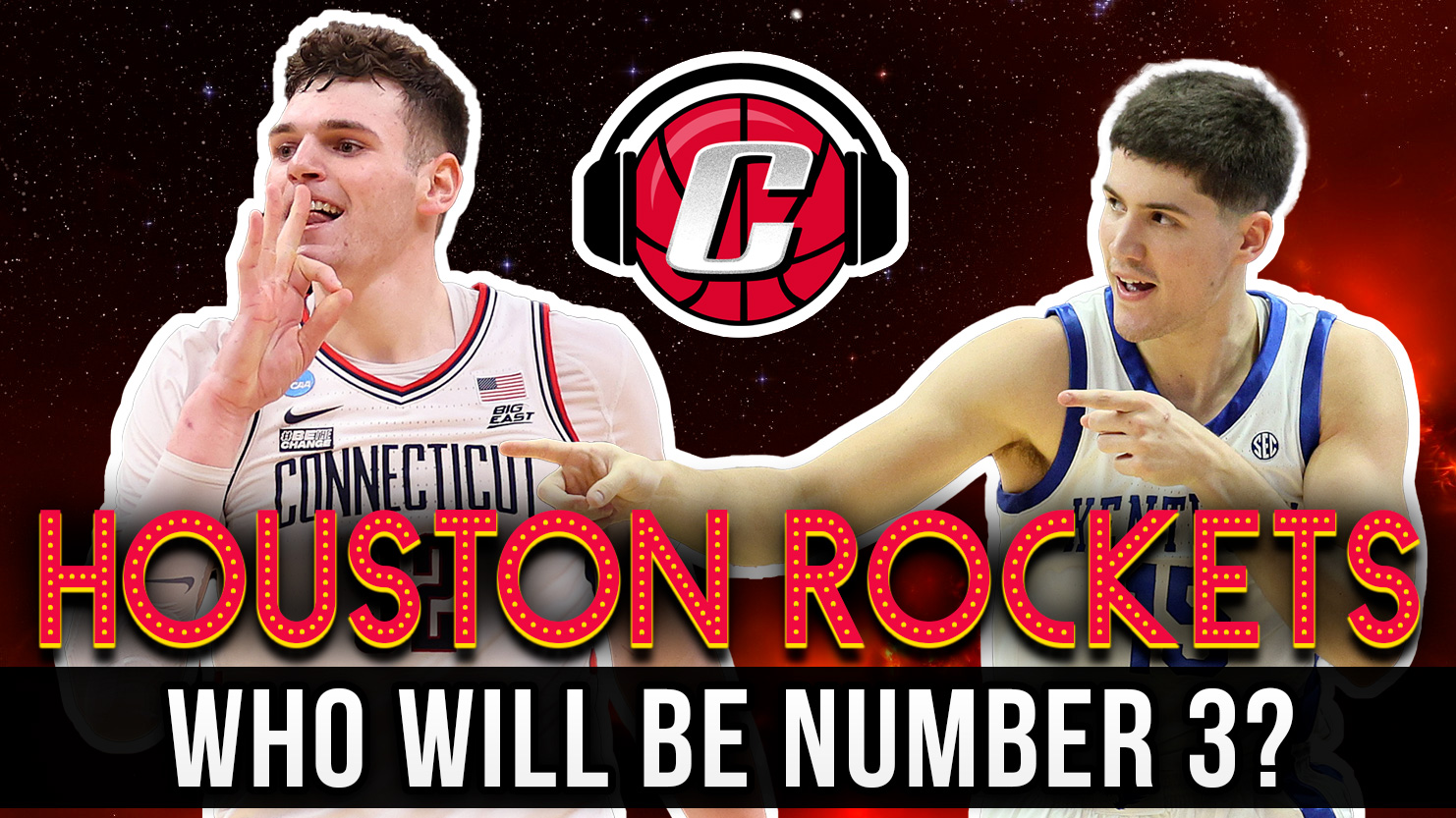
It’s officially NBA Draft Week!
The weeks of speculation are coming to an end as we’ve just about arrived at the 2024 NBA Draft. The Rockets hold picks #3 and #44 and could be quite active on the trade market.
Dave Hardisty and David Weiner paired up on the ClutchFans podcast to discuss the options before the Houston Rockets as they approach the June 26th NBA Draft. Is it really down to Donovan Clingan and Reed Sheppard as options? The pair also discuss trade-down options and whether Devin Carter could be intriguing to Ime Udoka. And are the Rockets a darkhorse for a Paul George trade?
The podcast premieres at 8:00am CT! Come join us!
Houston Rockets
Podcast: Houston Rockets options with the #3 pick of the 2024 NBA Draft
Published
5 months agoon
May 21, 2024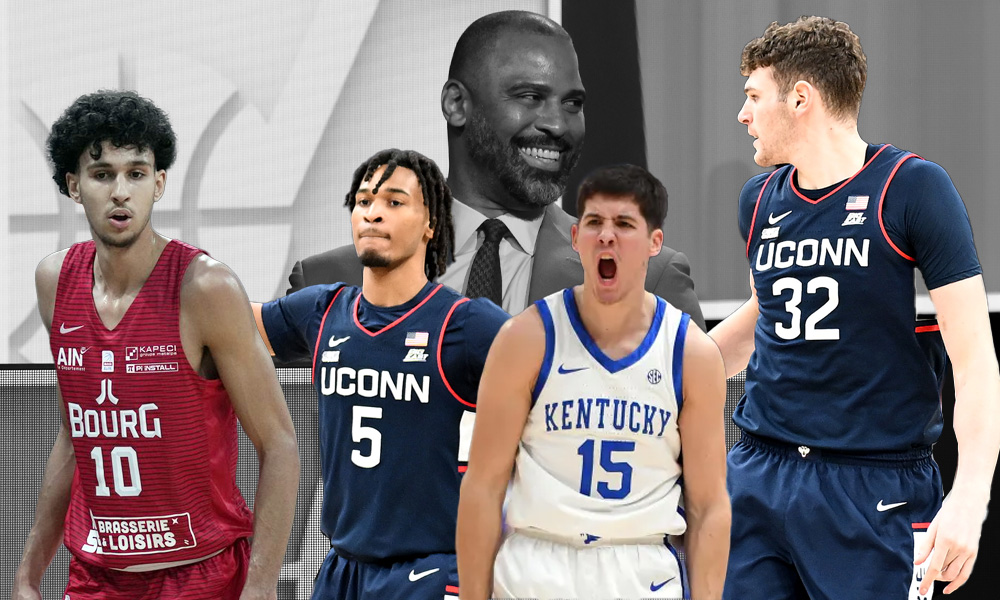
The offseason is now underway.
The forecast looks good for the Houston Rockets, but… there’s pressure as well this offseason because there are a handful of other West teams that might have rosier futures. Ime Udoka wants to win and win big. As we are about five weeks away from the NBA Draft, what are the Rockets looking to do this summer?
David Weiner joined Dave Hardisty on the ClutchFans podcast to discuss the Rockets shockingly landing the #3 pick and their options in this draft, including Reed Sheppard, Donovan Clingan, Zaccharie Risacher, Stephon Castle, Matas Buzelis and others. They also discuss the possibility of some big game hunting in Houston.
Houston Rockets
Podcast: Steven Adams, Mikal Bridges and Trade Possibilities for the Rockets
Published
9 months agoon
February 3, 2024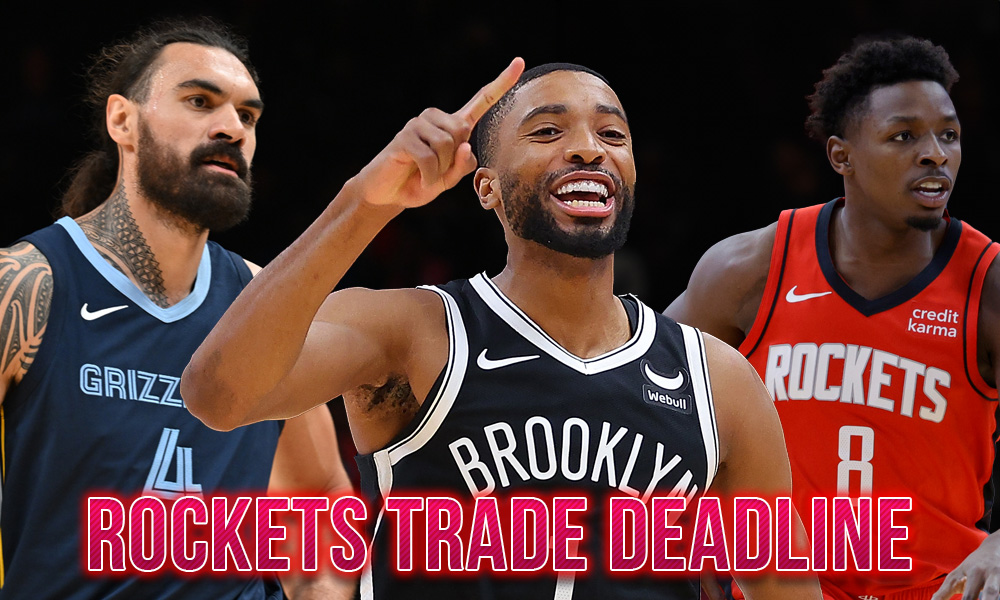
The Houston Rockets already made one deal, acquiring center Steven Adams from Memphis for a handful of second-round picks, but we still have several days left before this Thursday’s NBA Trade Deadline.
Are more deals on the way?
Rumors of interest in Mikal Bridges have swirled, with the Rockets holding precious (and unprotected) first-round picks from Brooklyn. They also could use some help inside this season, which Adams can not provide. Shooting is always in demand.
David Weiner joined Dave Hardisty on the ClutchFans podcast to discuss the Adams trade, its impact on the Rockets in 2024-25 and beyond, the Mikal Bridges rumors, the Brooklyn picks, other trade possibilities and options for Rafael Stone moving forward. Also discussed is the play of Houston’s core 6 prospects: Amen Thompson, Cam Whitmore, Alperen Sengun, Jabari Smith Jr., Tari Eason and Jalen Green.
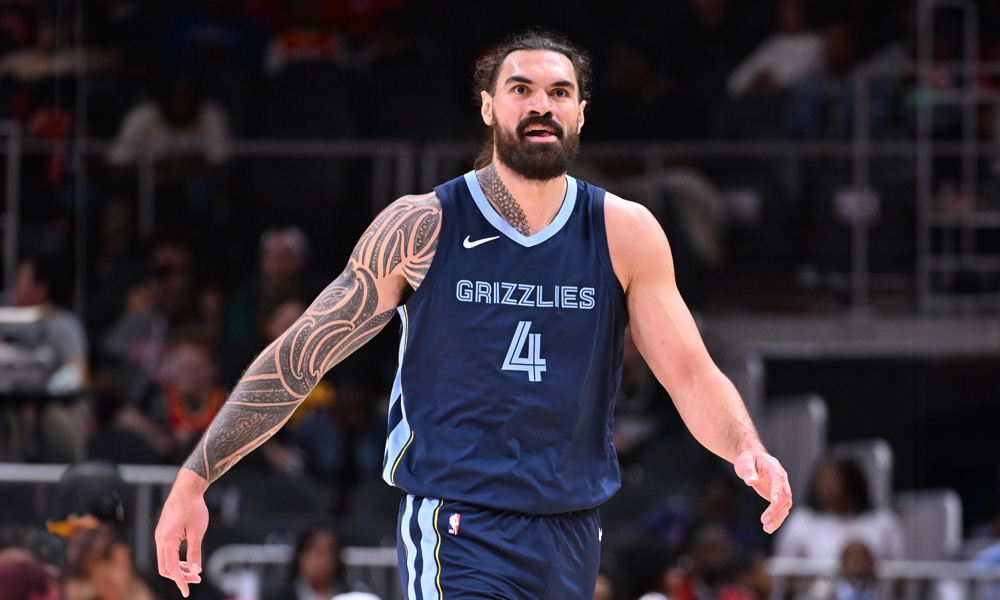
The Rockets made a surprise trade on Thursday, sending the contract of Victor Oladipo and three second-round picks to Memphis for center Steven Adams.
The deal came together quickly and the Rockets had a small window to get it done, hence why this trade was made with a week to go until the trade deadline.
The Price
When you consider that Memphis did this for cost savings primarily and that Adams would not play for any team in the league this season, the price seemed a little high to me. The Rockets gave up the OKC second-round pick this year, which is no big loss, but they also give up the better of Brooklyn’s or Golden State’s second-round pick this season. That’s a pretty good pick (likely in the late 30’s). They also give up the better of Houston’s or OKC’s second-round pick in 2025. If things go as planned for the Rockets, that pick should be in the 45-55 range.
But they didn’t sacrifice a first-round pick, which would have been brutal, and they were not going to use all those seconds this season. So it’s just a matter of opportunity cost — who else could they have gotten for this package?
My understanding is they (particularly Ime Udoka) are very high on Adams.
The Rockets also did this move for cap purposes as well. By moving out the Oladipo contract, which was expiring, and bringing in Adams’ deal, which is signed for $12.4M next season, the window for the Rockets to put together a trade package for a star player is extended out until the 2025 trade deadline. They continue to wait to see which players, if any, shake loose here and become available. They want flexible (see: expiring) contracts that they can combine with assets and this gives them another year to be in that position.
The Trade
It’s not often that the Rockets acquire a player I had not considered beforehand but that’s the case with Steven Adams. The Rockets sorely need a big with size that provides more traditional center strengths, making Clint Capela, Robert Williams, Nick Richards or Daniel Gafford potential candidates, but Adams was overlooked for a few reasons.
First, the 30-year old big man is out for the season after knee surgery cost him the entire 2023-24 campaign, so the Rockets won’t get any benefit from this trade this season. Secondly, Adams is not your traditional center either when it comes to rim protection.
But what Adams does do, he’s really good at and he has some of the same strengths of Brook Lopez, who the Rockets tried to sign in the offseason. Adams is quite possibly the strongest guy in the league and a legitimate 6-foot-11 with a 7-foot-5 wingspan. He’s an outstanding screen-setter, something that could really benefit the likes of Fred VanVleet, Amen Thompson and Jalen Green. He was also an elite rebounder last season, finishing 6th in the league in caroms at 11.5 a game despite playing just 27.0 minutes a contest.
After watching Jonas Valanciunas absolutely bully the Rockets inside on Wednesday, it should be apparent by now to everyone that this was a pretty big need.
In 2021-22, the Memphis Grizzlies finished #2 in the West at 56-26. Their top two players in Net Rating that season were Dillon Brooks (+11.0) and Adams (+8.3), key cogs in a defense that held opponents to 108.6 points per 100 possessions. They’re both now Houston Rockets.
So this adds another trusted vet to Ime Udoka’s rotation.
The question is will the 30-year old Adams return to form after the knee injury? Adams sprained the posterior cruciate ligament in his right knee a year ago, which cost him the end of that season and the playoffs. He tried rehabbing it and it never got better, so surgery became the option just as this season was kicking off.
I like to think the Rockets did their due diligence on that, despite the short time it took for this deal to come together, but that’s unclear.
If he does bounce back, then Udoka has a big man he can turn to reliably in situational matchups or on nights when the younger bigs struggle. He wouldn’t be Boban or even Jock Landale in that scenario — he’s going to play, so the frontcourt depth in 2024-25 should be better. In the end, they got a starting-caliber center who will have no problems coming off the bench, and that’s what they were looking for.
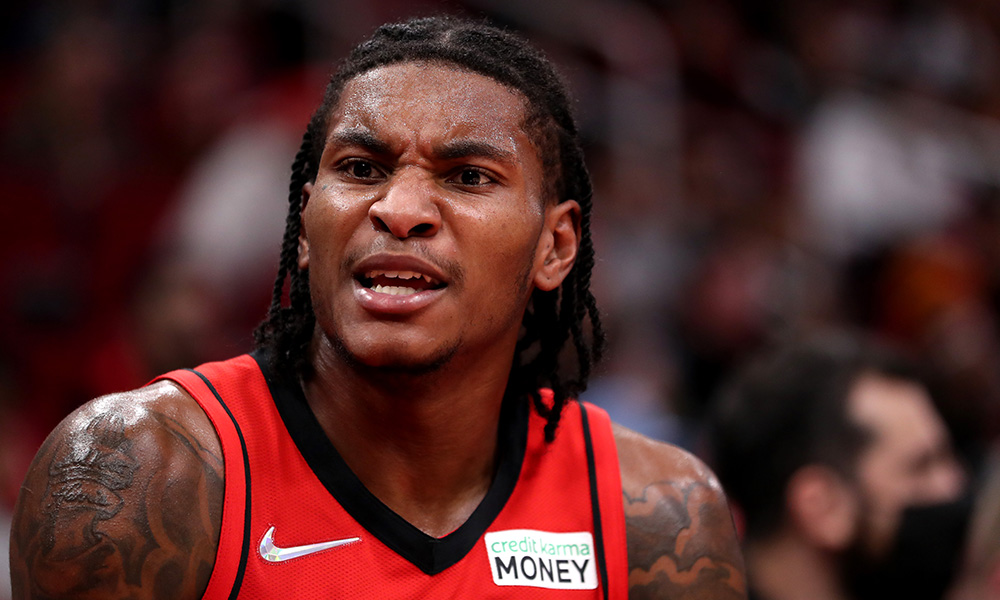
The Houston Rockets are back to being a professional NBA team once again.
The Rockets finally ended the Kevin Porter Jr. era on Tuesday, coughing up two second-round picks in order to unload his contract to the Oklahoma City Thunder, getting back the contract of Victor Oladipo and third-year forward Jeremiah Robinson-Earl. The move puts an end to a long investment and very rocky tenure with KPJ.
David Weiner joined Dave Hardisty on the ClutchFans podcast to discuss the Porter Jr. Experiment, the price paid to move him, Houston’s potential trade options moving forward, the new culture and the current state of the Rockets young core.

